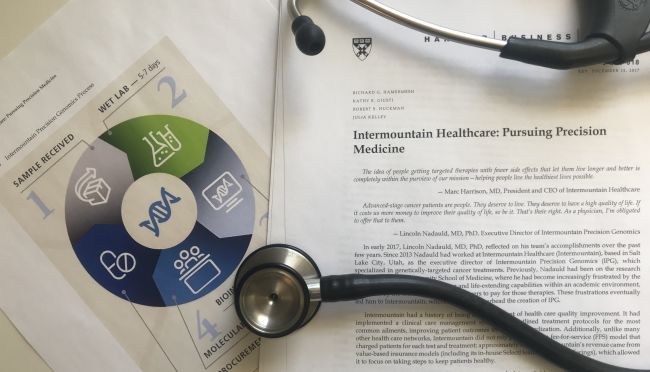Knowledge Sharing →
→
.jpg)
- 31 Oct 2023
- HBS Case
Checking Your Ethics: Would You Speak Up in These 3 Sticky Situations?
Would you complain about a client who verbally abuses their staff? Would you admit to cutting corners on your work? The answers aren't always clear, says David Fubini, who tackles tricky scenarios in a series of case studies and offers his advice from the field.

- 14 Jan 2020
- Working Paper Summaries
Engineering Serendipity: The Role of Cognitive Similarity in Knowledge Sharing and Knowledge Production
By creating opportunities for cross-disciplinary scientists to meet and talk as part of a natural field experiment, this study analyzes and finds evidence for a systematic relationship between knowledge sharing and knowledge production in the sciences. Findings may extend to similar types of cross-disciplinary knowledge-sharing opportunities in other settings.

- 06 Jan 2020
- Research & Ideas
Motivate Your High Performers to Share Their Knowledge
Companies are sitting on a largely untapped resource to improve employee performance, says Christopher Stanton—the knowledge of their co-workers. Open for comment; 0 Comments.

- 26 Mar 2019
- Working Paper Summaries
Managed Ecosystems and Translucent Institutional Logics: Engaging Communities
Organizations increasingly rely on engagement with external communities of contributors. This paper explores transitions to a managed-ecosystem governance mode and its implications for strategy and innovation. To be successful, firms must develop the capabilities to shepherd communities, leverage without exploiting them, and share intellectual property rights.

- 28 Feb 2019
- Cold Call Podcast
Pursuing Precision Medicine at Intermountain Healthcare
What happens when Intermountain Healthcare invests resources in an innovative precision medicine unit to provide life-extending, genetically targeted therapies to late-stage cancer patients? Professors Richard Hamermesh and Kathy Giusti discuss the case and its connections to their work with the Kraft Precision Medicine Accelerator. Open for comment; 0 Comments.

- 07 Dec 2018
- Working Paper Summaries
Oral History and Writing the Business History of Emerging Markets
Oral history is a valuable resource to explore how businesses developed and functioned in Africa, Asia, and Latin America, regions with a growing share of global economic activity and the majority of the world’s population. While oral history is not uncritical, it provides openings for opinions, voices, and judgements on events on which there was often silence.

- 26 Sep 2018
- Working Paper Summaries
Shifting Centers of Gravity: Host Country versus Headquarters Influences on MNC Subsidiary Knowledge Inheritance
This study compares how multinational corporation subsidiaries inherit knowledge from both the headquarters and the local context. To do so the authors analyzed seven years of data (2005–2011) of US patents filed by all subsidiaries of the top 25 US headquartered multinationals.
- 08 Sep 2015
- Research & Ideas
Knowledge Transfer: You Can't Learn Surgery By Watching
Learning to perform a job by watching others and copying their actions is not a great technique for corporate knowledge transfer. Christopher G. Myers suggests a better approach: Coactive vicarious learning. Open for comment; 0 Comments.
- 05 Feb 2015
- Research & Ideas
How New BofA Executives Learn its ’Deep Smarts’
Bank of America's stringent onboarding process for new execs ensures they understand role expectations, quickly develop networks, and learn from other leaders what it takes to succeed. From the new book by Dorothy Leonard and colleagues, Critical Knowledge Transfer. Open for comment; 0 Comments.
- 19 Jan 2015
- Research & Ideas
Is Wikipedia More Biased Than Encyclopædia Britannica?
By identifying politically biased language in Encyclopædia Britannica and Wikipedia, Feng Zhu hopes to learn whether professional editors or open-sourced experts provide the most objective entries. Open for comment; 0 Comments.
- 23 Jul 2007
- Research & Ideas
HBS Cases: How Wikipedia Works (or Doesn’t)
For HBS professor Andrew McAfee, Wikipedia is a surprisingly high-quality product. But when his concept of "Enterprise 2.0" turned up on the online encyclopedia one day—and was recommended for deletion—McAfee and colleague Karim R. Lakhani knew they had the makings of an insightful case study on collaboration and governance in the digital world. Key concepts include: Despite thousands of participants, Wikipedia operates under a very ornate and well-defined structure of participation that enables them to produce a highly regarded online encyclopedia. A group of people in the Wikipedia world characterized as "exclusionists" could dampen user enthusiasm by increasing barriers to acceptance of Wikipedia articles. Knowledge-sharing technologies such as wikis are coming into increasing use in the corporate world, but companies must understand that a top-down approach to administering them will lead to certain extinction. Closed for comment; 0 Comments.

The Network Effect: Why Companies Should Care About Employees’ LinkedIn Connections
What do Honeywell, IBM, and Pfizer have in common? Employees with strong professional networks. A study of 2 billion employee relationships on LinkedIn probes the power of such connections—and potential benefits for companies. Research by Frank Nagle.